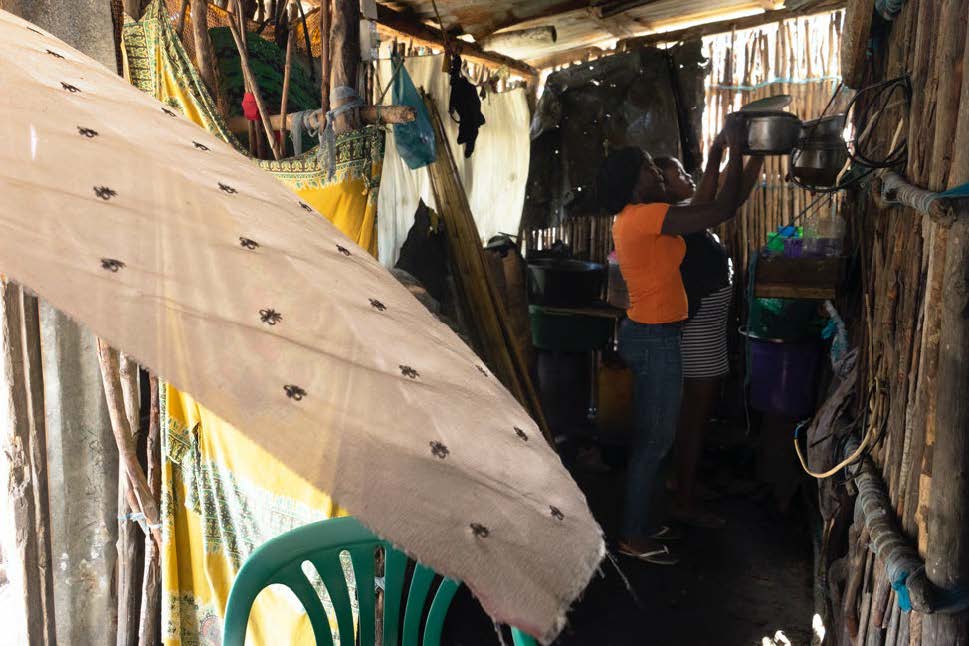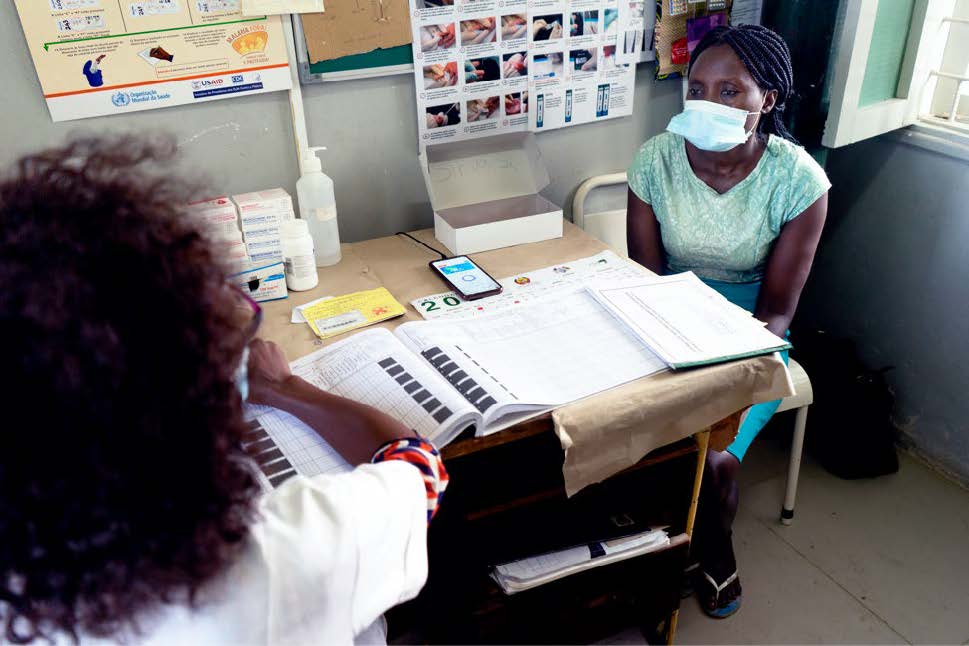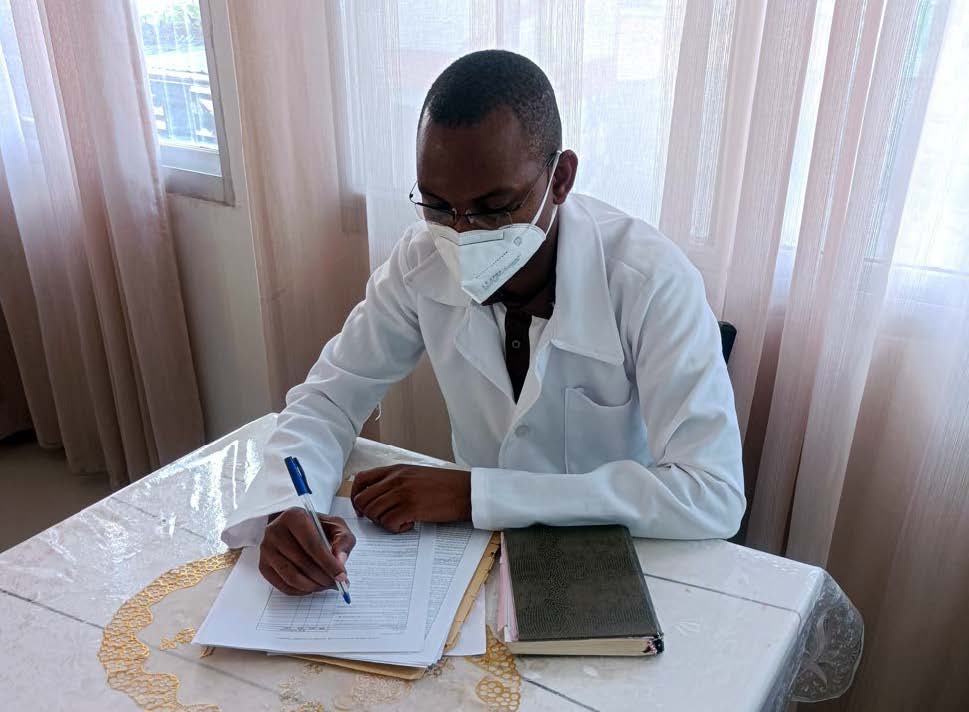
“I was not the same person. I was uneasy because it was something that bothered me deeply.
I did not know what [cervical cancer] really was, but after the treatment, after the care that the nurse gave me, thank God everything went back to normal. I feel like a new person.”
Hélia Rudofo Paulo
Hélia lives in a small, crowded house in central Quelimane City. Hélia makes a living by selling small charcoal bundles outside her house. She has three children, a seventeen-year-old girl and two boys, twelve and seven. Hélia has been on antiretroviral therapy (ART) since 2017. None of her children are HIV-positive.

During one of her ART follow-up visits at the 4 de Dezembro health facility in Quelimane, a lay counselor noticed Hélia was having pain in her pelvic area, as well as other symptoms. The lay counselor referred her for Cervical Cancer Screening (CCS), where pre-cancerous lesions were seen on examination.
“When I went there, they told me that I had a small problem and that they would give me a paper to go to the Central Hospital," explained Hélia. After the consultation, Hélia completed the recommended treatment. Hélia adds, with noticeable relief, that after finishing her treatment “I didn't suffer any more pain.” She was able to return to her normal life.
If not diagnosed early, the consequences of cervical cancer can be very serious. Maternal and Child Health Nurse (MCHN) Maria Alfinete explains, “It can reach the point where a woman can no longer take care of her house because she is so sick. She doesn't go to work; she may even die…Her children will be without a mother.” Alfinete has been an MCHN and Quelimane District focal point for the Prevention and Control of Cervical and Breast Cancer (CACUM) program at the 4 de Dezembro Health Facility since 2016.

Belito Castolino is a health technician working for Friends in Global Health (FGH) with the responsibility of coordinating the operationalization of the support FGH provides to the Provincial Directorate of Health in Zambézia (DPS-Z) for the implementation of the CACUM program. According to Castolino, FGH prioritizes cervical cancer screening as an important part of its HIV Prevention and Care & Treatment program. The human papillomavirus (HPV), which can cause cervical cancer, “…sets in quickly in women with immunodepression, that is to say, the probability of getting cancer is higher because their immunity is weak.”
Early detection is very important as Castolino explains, "When cancer reaches the later stages, it can be irreversible, and it can kill.”
However, this does not have to be the case when diagnosed early. “Women can save themselves from getting cancer when they get early treatment for precancerous lesions. For this reason, we are working hard towards screening as early as possible,” Alfinete adds enthusiastically.
Thanks to FGH and the efforts of health workers in the field, increasingly, more HIV-positive women have been screened for cervical cancer, and those with abnormal/pre-cancerous lesions have been referred for care in a timely fashion so that they can receive the care they need.
Such results derive from the productive collaboration between FGH and DPS-Z. In the words of the Director of the Obstetrics and Gynecology Department at Quelimane Central Hospital (QCH), Dr. Equibal Muanaria, the collaboration is very strong “…because FGH can provide us materials that we need for our operation, specifically equipment for electrocoagulation, printed materials like patients’ forms, lockers where we can keep all filled forms, and materials that we need to use when screening as well as in the treatment of precancerous lesions.”
Additionally, “FGH allocated nurses and counselors to our CCS and treatment of precancerous lesions service.” Moreover, FGH provides support for the referral of women with pre-cancerous lesions for treatment from the peripheral HFs to the reference centers, and support in making appointments to reduce the delay in transportation from their places of residence to the HFs.
From April to June 2022 (Quarter 3 COP21), 429 women were screened for cervical cancer at the 4 de Dezembro health facility in Quelimane, corresponding to 72% (597) target achievement for the reporting period. Out of the 429 screened women, 24 (5.6%) were identified as having abnormal/pre-cancerous lesions on initial visual inspection with acetic acid (VIA) examination. Of the 24 women with lesions on their cervix, all 15 (100%) women with lesions covering less than 75% of their cervix received cryotherapy or thermoablation, procedures performed at the health facility, immediately after the lesions were identified. Six (67%) out of the nine remaining women with lesions covering 75% or more of their cervix were referred to the Quelimane Central Hospital to receive higher-level care, where they underwent LEEP (Loop Electrosurgical Excision Procedure), an effective and safe procedure that prevents cervical cancer by removing abnormal cells from a woman’s cervix using a small electrical wire loop.
These results were achieved through the Avante Program. Avante is funded by PEPFAR through the Centers for Disease Control and Prevention (CDC) and seeks to control the HIV epidemic by supporting the sustainable implementation of HIV services in Zambézia Province. Avante is implemented by the Vanderbilt University Medical Center (VUMC) and its affiliate Friends in Global Health (FGH), which works in partnership with the Government of Mozambique at the national, provincial, district, health facility, and community levels.